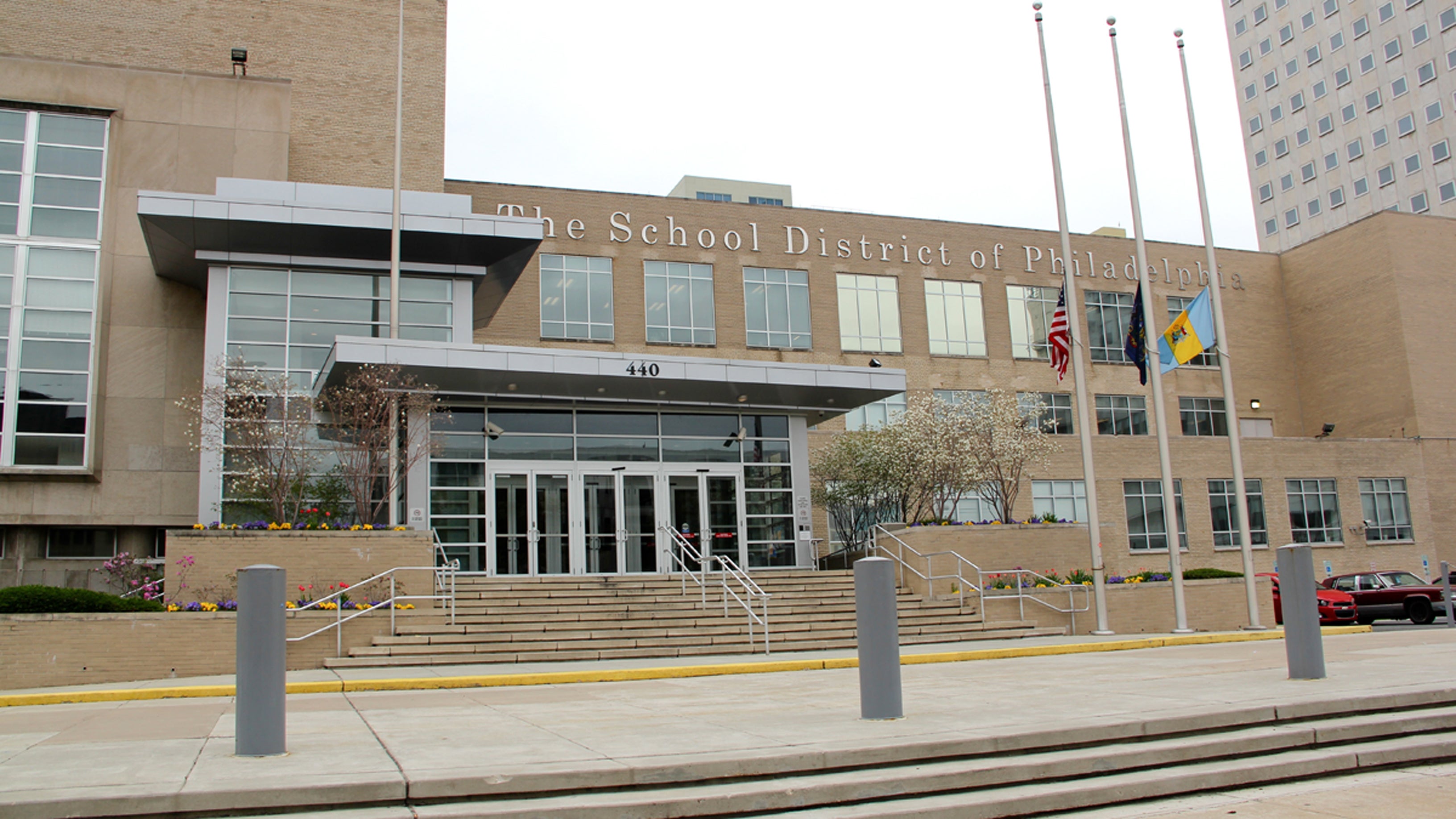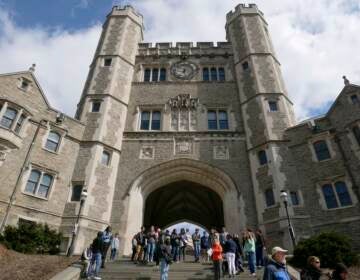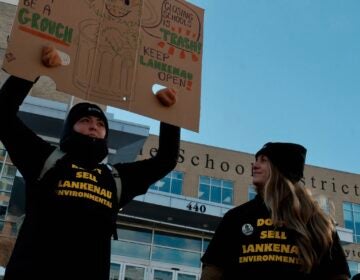Charter, district officials make progress on major reforms, but can’t reach deal

Philadelphia School District headquarters at Broad and Spring Garden streets. (Emma Lee/WHYY file)
Though the School District of Philadelphia and its charter community often bicker publicly, behind closed doors there have been substantial attempts by the two sides to reach consensus on how to rewrite Pennsylvania’s 20-year-old charter law, NewsWorks/WHYY has learned.
And those attempts offer a fascinating glimpse into what charter authorization and renewal may look like some day in a school district that has roughly half of Pennsylvania’s charter school students.
From around October to March, district and charter officials held a series of meetings designed to find common ground on charter reform and then produce either a new charter law proposal or a series of recommendations both sides could rally behind. The parties hoped they could present a proposal to Harrisburg that had the full support of public school advocates, charter advocates, and the district.
Negotiations felt short of that goal, instead stalling under contested circumstances.
The talks did, however, reveal some notable commonalities that could forecast the future of Philadelphia’s charter sector.
For instance, both sides agreed charters should be divided into three basic tiers. High performers would receive near-automatic renewals and be allowed to expand relatively easily. Mid-level performers would go through a review process similar to what charters experience now. Low-performing charters would be fast-tracked for closure and given limited avenues for appeal.
Charters would be sorted using a standardized performance rubric–something that could theoretically take the mystery out of charter evaluation.
“We wanted whatever we came up with to be transparent and predictable,” said Superintendent William Hite.
The two sides also worked to formalize the charter approval and renewal process so that it had firmer deadlines and expectations.
Perhaps not surprisingly, the two sides never agreed on over where to draw the dividing line between the three tiers of charter schools and how specifically to construct the performance rubric.
“There was quite a bit of common ground,” said Laurada Byers, founder of Russell Byers Charter School and a party to the negotiations. “But it was when you got to the details that it got squishy.”
“The common ground was that there should be charters who are doing well that should automatically get renewals and also expand,” she added.
Byers joined Mastery Charter Schools CEO Scott Gordon, Global Leadership Academy Charter Schools CEO Naomi Booker, and Mark Gleason, executive director of Philadelphia School Partnership, on the charter side of the table.
“Everybody in that room believes and wants accountability for charter schools and there is a lot of common ground about how to achieve that,” said Gleason. “The challenge is in identifying the difference between ensuring accountability and creating unnecessarily intrusive regulatory burden.”
The district’s representation included high-ranking officials such as superintendent William Hite, Chief Financial Officer Uri Monson, and DawnLynne Kacer, executive director of the Charter Schools Office. Donna Cooper, executive director of the non-profit Philadelphia Children for Citizens and Youth (PCCY) and public school advocate, also participated in the talks.
According to Cooper, both sides agreed the theoretical performance rubric should be weighted to favor charter schools that serve average or higher-than-average numbers of low-income students. The district initially wanted to reserve the highest performance tier for charter schools that rank among the top 10 percent of comparable Philadelphia schools. Charter advocates pushed for all schools in the top 50 percent.
Ultimately, charter advocates felt the top third of performers should be fast-tracked for renewal and expansion. District representatives set the bar at the top 25 percent.
There was, according to sources, relatively broad agreement that the bottom 10 percent of charter schools–calculated on a rolling, three-year basis–should be funneled into a quick and relatively inflexible closure process.
That would be a major change from how the system operates now.
When the district wants to close a low-performing charter school, it typically must wait until the school’s five-year renewal expires. If the district then decides not to renew the school’s charter, the charter can appeal to a state board.
In the same vein, popular and high-performing charters often find it difficult to gain new seats. Applying for a new charter requires significant time and paperwork. Charters can apply for expansions when they’re up for renewal, but those opportunities arise once every five years and require their own application process.
In the new system, devised during district-charter negotiations, expansion and renewal would be almost automatic for schools that significantly outperform city averages. School would have to demonstrate financial stability and show they have the capacity to take on more students, but could more or less proceed unimpeded from there.
Hite said the district wanted to partcipate in negotiations because in the past it had only opposed charter legislation out of Harrisburg, rather than proposing alternatives.
“I wanted to take a different approach and have the district be more constructive,” he said.
Hite believes the parties were close to reaching a final set of proposals, but couldn’t “get there fast enough.”
“The more important thing is that there was fundamental agreement on 98 percent of the things we set out to address,” Hite said.
Others say that final two percent of separation contained some of the most important negotiating points, and that a clear resolution never felt imminent.
Both sides say they are no longer actively talking, but give different reasons for why discussions stalled.
Charter advocates say they were turned off by the district’s latest round of charter renewal agreements, which were delivered in April.
Every year the district offers renewal agreements to charters whose five-year terms have expired, but several charter schools said this year’s batch of agreements included more stringent stipulations than past versions. As a result, more than a dozen charters refused to sign their agreements.
Charter advocates say the resulting tension soured their mood and pulled attention away from further negotiations.
“The word that came to mind a lot was overreach,” said Byers.
Negotiators from the charter sector also fretted over language in draft proposals that would allow individual districts to layer additional requirements on top of those spelled out in state law.
“One of the biggest challenges is the notion of the charter office having the leeway to establish new performance criteria after a charter has been granted or renewed,” said Gleason. “Charter schools, like any organization, want clarity more than anything about what they must do.”
In particular, Philadelphia charters worry any wiggle room in a new state law could be used by a future version of the district’s Charter Schools Office to stunt charter growth. Philadelphia charters also worry that the state-controlled School Reform Commission could be replaced by a local school board that would be unfriendly to charters.
District officials, however, have their own uncertainties to consider.
If a new state charter law isn’t specific enough, it would leave local districts at the mercy of whoever controls the Pennsylvania Department of Education. Charter growth has already put a dent in the School District of Philadelphia’s finances and is among the primary reasons the district’s costs are growing twice as fast as its revenues.
If the law is too prescriptive, though, it will be seen as overly burdensome by charter operators.
District officials and public school advocates, however, say talks stalled because of timing, not substance.
In early April, the state house’s education committee introduced a new charter reform bill, House Bill 97.
“That pulled the rug out from under us,” said Cooper.
She believes charter advocates saw in HB 97 a more favorable bill and decided to rally behind it instead of continuing work on compromise legislation. House Bill 97 has already passed the state house and now awaits action in the state senate.
Both sides insist, however, that just because talks have stalled doesn’t mean the conversation is over.
The district has been using language developed through negotiations to lobby for changes to HB 97.
“I think it’s likely having this alternative approach will either cause [HB] 97 to stall in the senate or make [HB] 97 more thoughtful,” Cooper said.
Gleason says that although PSP is supporting HB 97, he still wants to work toward a solution that people on all sides of the Philadelphia charter debate can endorse.
“There’s enough will around the table for this conversation to continue in the future,” Gleason said. “That could be sooner or that could be later.”
WHYY is your source for fact-based, in-depth journalism and information. As a nonprofit organization, we rely on financial support from readers like you. Please give today.





